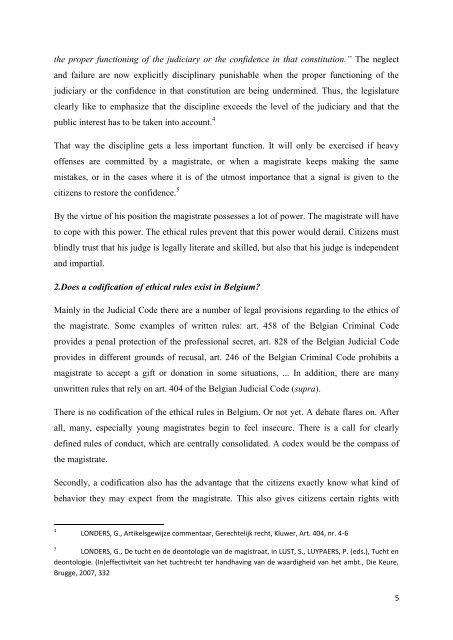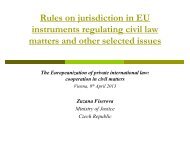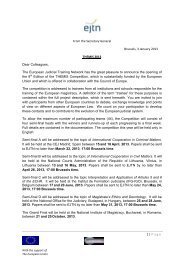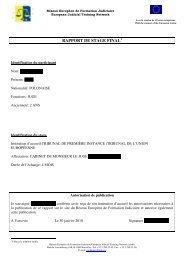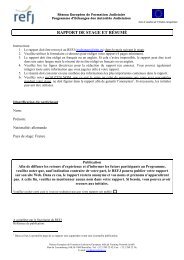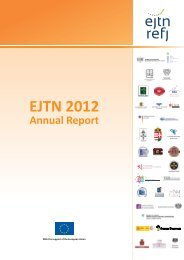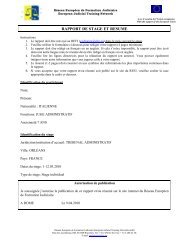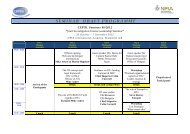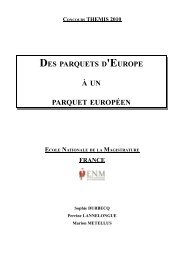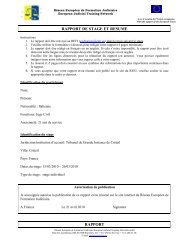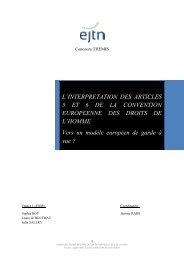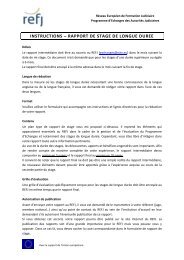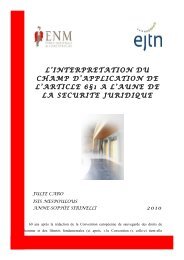Written paper Belgium_1.pdf - European Judicial Training Network
Written paper Belgium_1.pdf - European Judicial Training Network
Written paper Belgium_1.pdf - European Judicial Training Network
Create successful ePaper yourself
Turn your PDF publications into a flip-book with our unique Google optimized e-Paper software.
the proper functioning of the judiciary or the confidence in that constitution.” The neglect<br />
and failure are now explicitly disciplinary punishable when the proper functioning of the<br />
judiciary or the confidence in that constitution are being undermined. Thus, the legislature<br />
clearly like to emphasize that the discipline exceeds the level of the judiciary and that the<br />
public interest has to be taken into account. 4<br />
That way the discipline gets a less important function. It will only be exercised if heavy<br />
offenses are committed by a magistrate, or when a magistrate keeps making the same<br />
mistakes, or in the cases where it is of the utmost importance that a signal is given to the<br />
citizens to restore the confidence. 5<br />
By the virtue of his position the magistrate possesses a lot of power. The magistrate will have<br />
to cope with this power. The ethical rules prevent that this power would derail. Citizens must<br />
blindly trust that his judge is legally literate and skilled, but also that his judge is independent<br />
and impartial.<br />
2.Does a codification of ethical rules exist in <strong>Belgium</strong>?<br />
Mainly in the <strong>Judicial</strong> Code there are a number of legal provisions regarding to the ethics of<br />
the magistrate. Some examples of written rules: art. 458 of the Belgian Criminal Code<br />
provides a penal protection of the professional secret, art. 828 of the Belgian <strong>Judicial</strong> Code<br />
provides in different grounds of recusal, art. 246 of the Belgian Criminal Code prohibits a<br />
magistrate to accept a gift or donation in some situations, ... In addition, there are many<br />
unwritten rules that rely on art. 404 of the Belgian <strong>Judicial</strong> Code (supra).<br />
There is no codification of the ethical rules in <strong>Belgium</strong>. Or not yet. A debate flares on. After<br />
all, many, especially young magistrates begin to feel insecure. There is a call for clearly<br />
defined rules of conduct, which are centrally consolidated. A codex would be the compass of<br />
the magistrate.<br />
Secondly, a codification also has the advantage that the citizens exactly know what kind of<br />
behavior they may expect from the magistrate. This also gives citizens certain rights with<br />
4 LONDERS, G., Artikelsgewijze commentaar, Gerechtelijk recht, Kluwer, Art. 404, nr. 4-6<br />
5 LONDERS, G., De tucht en de deontologie van de magistraat, in LUST, S., LUYPAERS, P. (eds.), Tucht en<br />
deontologie. (In)effectiviteit van het tuchtrecht ter handhaving van de waardigheid van het ambt., Die Keure,<br />
Brugge, 2007, 332<br />
5


